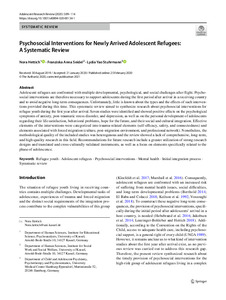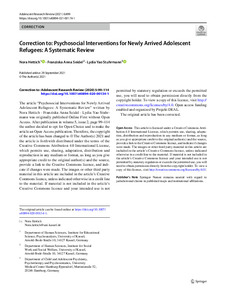| dc.date.accessioned | 2021-12-06T15:25:27Z | |
| dc.date.available | 2021-12-06T15:25:27Z | |
| dc.date.issued | 2020-02-25 | |
| dc.identifier | doi:10.17170/kobra-202111055029 | |
| dc.identifier.uri | http://hdl.handle.net/123456789/13425 | |
| dc.description | The article “Psychosocial Interventions for Newly Arrived Adolescent Refugees: A Systematic Review” written by Nora Hettich · Franziska Anna Seidel · Lydia Yao Stuhrmann was originally published Online First without Open Access. After publication in volume 5, issue 2, page 99–114 the author decided to opt for Open Choice and to make the article an Open Access publication. | eng |
| dc.description.sponsorship | Gefördert im Rahmen des Projekts DEAL | ger |
| dc.language.iso | eng | eng |
| dc.rights | Namensnennung 4.0 International | * |
| dc.rights.uri | http://creativecommons.org/licenses/by/4.0/ | * |
| dc.subject | refugee youth | eng |
| dc.subject | adolescent refugees | eng |
| dc.subject | psychosocial interventions | eng |
| dc.subject | mental heath | eng |
| dc.subject | initial integration process | eng |
| dc.subject | systematic review | eng |
| dc.subject.ddc | 150 | |
| dc.subject.ddc | 300 | |
| dc.title | Psychosocial Interventions for Newly Arrived Adolescent Refugees: A Systematic Review | eng |
| dc.type | Aufsatz | |
| dcterms.abstract | Adolescent refugees are confronted with multiple developmental, psychological, and social challenges after flight. Psychosocial interventions are therefore necessary to support adolescents during the first period after arrival in a receiving country and to avoid negative long-term consequences. Unfortunately, little is known about the types and the effects of such interventions provided during this time. This systematic review aimed to synthesize research about psychosocial interventions for refugee youth during the first year after arrival. Seven studies were identified and showed positive effects on the psychological symptoms of anxiety, post-traumatic stress disorder, and depression, as well as on the personal development of adolescents regarding their life satisfaction, behavioral problems, hope for the future, and their social and cultural integration. Effective elements of the interventions were categorized into trauma-related elements (self-efficacy, safety, and connectedness) and elements associated with forced migration (culture, post-migration environment, and professional network). Nonetheless, the methodological quality of the included studies was heterogenous and the review showed a lack of comprehensive, long-term, and high-quality research in this field. Recommendations for future research include a greater utilization of strong research designs and translated and cross-culturally validated instruments, as well as a focus on elements specifically related to the phase of adolescence. | eng |
| dcterms.accessRights | open access | |
| dcterms.creator | Hettich, Nora | |
| dcterms.creator | Seidel, Franziska Anna | |
| dcterms.creator | Stuhrmann, Lydia Yao | |
| dc.relation.doi | doi:10.1007/s40894-020-00134-1 | |
| dc.subject.swd | Flüchtling | ger |
| dc.subject.swd | Minderjähriger | ger |
| dc.subject.swd | Erwachsener | ger |
| dc.subject.swd | Psychosoziale Betreuung | ger |
| dc.subject.swd | Psychische Gesundheit | ger |
| dc.subject.swd | Soziale Integration | ger |
| dc.type.version | publishedVersion | |
| dcterms.source.identifier | eissn:2363-8354 | |
| dcterms.source.issue | Issue 2 | |
| dcterms.source.journal | Adolescent Research Review | eng |
| dcterms.source.pageinfo | 99-114 | |
| dcterms.source.volume | Volume 5 | |
| kup.iskup | false | |



